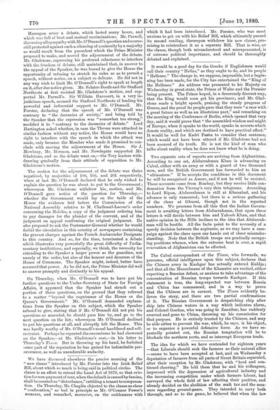Hereupon arose a debate, which lasted many hours, and which
was full of heat and mutual recriminations. Mr. Parnell, disowning all sympathy with Mr. O'Donnell's question midcourse, still protested against such a silencing of a minority by a majority as would result from the precedent which the Prime Minister proposed to make, and moved the adjournment of the debate. Mr. Gladstone, expressing his profound reluctance to interfere with the freedom of debate, still maintained that, in answer to the appeal of the Speaker, he was bound to give the House the opportunity of refusing to stretch its rules so as to permit a speech, without notice, on a subject so delicate. He did not in any way wish to limit Mr. O'Donnell's right to speak at length on it, after due notice given. Mr. Sclater-Booth and Sir Stafford Northcote at first resisted Mr. Gladstone's motion, and sup-
ported Mr. Farad's. Sir Harcourt, in a very in- judicious speech, accused Sir Stafford Northcote of lending his powerful and influential support to Mr. O'Donnell. Mr. Forster, declaring that the speech of Mr. O'Donnell was contrary to "the decencies of society," and being told by the Speaker that the expression was "somewhat too strong," modified it to "contrary to the decencies of debate." Lord Hartington asked whether, in case the Throne were attacked in similar fashion without any notice, the House would have no right to interfere with the speech in which the attack was made, only because the Member who made it promised to con- clude with moving the adjournment of the House. Sir J. Mowbray, Mr. Hermon, and Mr. Newdegate supported Mr. Gladstone, and so the debate went on,—the Tory leaders with- drawing gradually from their attitude of opposition to Mr. Gladstone's motion.


































 Previous page
Previous page